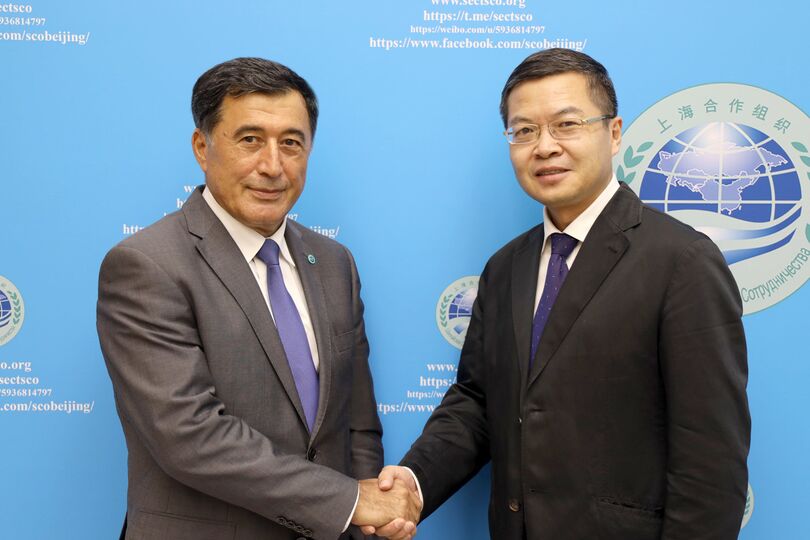On 14 August 2020, SCO Secretary-General Vladimir Norov received a delegation of the international television channel China Global Television Network (CGTN) headed by Ding Yong, Deputy Director of its European and Latin American Broadcasting Centre.
Vladimir Norov noted that, under the SCO Development Strategy up until 2025, the organisation will prioritise efforts to forge a positive perception of the SCO among the citizens of member states and to create a positive image of the organisation worldwide and in the region.
This is one of the SCO's main tasks in the field of media support, and this aims to speed up rapprochement between the member states and their peoples and to strengthen mutual neighbourliness and trust. For these purposes, the SCO Secretariat is conducting active media work with the support of leading media outlets of member states.
The Secretary-General noted that news agencies have been highly interested in SCO activities over the past few years. The 2018 and 2019 media forums in Beijing and Bishkek proved just how popular this format was. In this connection, the SCO Secretariat is now trying to create the relevant mechanism for media cooperation.
Vladimir Norov also noted the fruitful cooperation between the SCO Secretariat and CGTN. Considering this television channel's experience and capabilities, as well as the topicality and high popularity of various themes, he suggested studying the possibility of airing themed television shows about SCO countries, so as to more fully acquaint Chinese audiences with the culture and history of the organisation's member states, to hold intellectual and interactive competitions and events that would involve young people from the SCO member states studying in China and fluent in Chinese, English and Russian.
In turn, the Deputy Director of the European and Latin American Broadcasting Centre and the CGTN-Russian Television Channel's Deputy Director-General said the company now maintained contacts with 150 media outlets from various countries. Moreover, the channel provides over 1,000 videos daily. They are used by partners, including those from SCO countries, for preparing their own shows and news reports.
In an effort to expand practical cooperation between media outlets, CGTN suggests establishing a media pool of SCO member states to exchange experience and information and to create their own programmes.
According to Ding Yong, a similar platform involving Eurasian countries now exists and continues to post good results.
CGTN has produced a documentary about the SCO on the occasion of its 20th anniversary. In this connection, it was suggested that there should be a film competition to mark this date.
Mr Norov agreed that these proposals were topical and said it was important to involve all the SCO member states, observer states and dialogue partners in covering the association's activities. The Secretary-General noted the need for more English-language media publications about the SCO.
